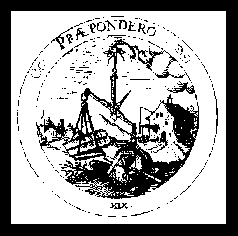Without End
The Exploration of Planets
Known and Unknown
John S. Lewis
(Perseus)
 We're not quite sure who this one is aimed at. If it is PhDs in astronomy at Harvard or CalTech, they are welcome to it. If it is homefolk, like you and me, god help us --- because it is full of chapters that sound like summaries of the IRS 1999 corporate tax code:
We're not quite sure who this one is aimed at. If it is PhDs in astronomy at Harvard or CalTech, they are welcome to it. If it is homefolk, like you and me, god help us --- because it is full of chapters that sound like summaries of the IRS 1999 corporate tax code:Each successive subclass, such as M1, is slightly less massive and slightly less luminous than the preceding. M2 stars, at 0.4 solar masses, have luminosities of 0.02 Suns, and so on, down through M5 stars (0.2 solar masses, 0.01 Suns luminosity) to about M8 (0.00001 Suns luminosity; 0.06 solar masses), the faintest and coolest (under 2500 K) stars known.
As we used to say in high school when some smart-ass came up with a bag-full of philosophical or scientific gibberish, DUH.
Lewis' agent, or his mother, or someone must have complained about the general unintelligibility of Worlds Without End because, just when the writing is about to drive you crazy, the author sticks in a duh to the 10th power:
By 1962, experts in celestial mechanics had pointed out that the late 1970s would present a rare planetary alignment, a sterling opportunity to send a spacecraft from Earth to Jupiter, Saturn, Uranus, and Neptune on a single arc. The Voyager spacecraft were built and launched to take advantage of this alignment. This mission, visiting five of the nine planets, soon became known as the Grand Tour. (The last previous Grand Tour opportunity was missed because space was not a high priority of President John Quincy Adams.)
DUH.
Every few pages Lewis might stuff in an interesting fact, unknown previously to this, your most astronomically dumb reviewer. For example, he tells us that the Sun is rare in that four out of five stars of its type are binaries, or worse, and that we should consider ourselves lucky, because planet rotation about a binary star is about as predictable as the sleeping habits of your friendly next-door speed freak.
Despite these occasional bits of interest, it's mostly rough sailing up there in spaceville. Ostensibly, the theme here is whether there is life in other galaxies --- but with all the dummies we've dug up to run this one, we can't figure out why they'd need any more people-types in the universe.
Worlds Without End also contains some pictures they tell us are of interesting star forms, but damned if we can make head-nor-tail of them. Most are similar to those photographs of Flying Saucers from the 50s which looked less like a space machine from the heavens and more like a blurred hamburger (with lettuce and mayo).
--- Lolita Lark
Thomas M. Daniel and
Frederick C. Robbins, Editors
(University of Rochester)
You'd never guess all this from the book Polio. It's very mannerly, orderly, logical --- with none of the passion that some of us feel daily: passions of rage, frustration, anger, tear-down-the-world (and, too --- occasional triumph over the entropy that rules us.) Because it is so clinical, with few upsets --- Polio is a low-level downer. The hardships are painted with ice; the triumphs are knee-deep in Fake Bravery. Unless you are into the history of now-rare infectious diseases, and the chance occurrence of major tragedy in "normal" people's lives --- this ain't your book.
It's an intermix of tales from the professionals who treated it, and those who went through it. Ann McLaughlin, a contemporary novelist, appears here. She and her husband were infected at the same time, probably by their infant (the disease is transmitted by fæces). Hers is a measured, careful, distanced tale, which indicates that she may not have integrated the pain of it still, after all these years. Then there is the story of Michael W R Davis, the "1944 Kentucky Polio Epidemic." Polio took his left arm, but from the way he tells us, it was no problem at all. No depression, no strain, not to worry. He calls it "My stubborn refusal to 'give into polio,'" a stance that has hung on "for many decades." The contrary thesis is that those of us who somehow "gave into it" (e.g., recognized the scalding of our souls by this astounding physical upheaval) are somehow less than perfect. His favorite aphorism is "There's always someone better off and someone worse off" --- a facile statement that doesn't even begin to address the dreadful truth of it.
Oddly, the best writings in Polio, come from the professionals --- doctors who were interns and residents during the great epidemics of the 1950s. "Polio and the Making of a Doctor" by Thomas M Daniel is a tender portrait of doctors, nurses, and orderlies caught up in a terrible siege, when children were dying around them in obvious and heart-breaking agony. (This, of course, is the great paradox that mocks all the careful tenets of Christianity, and haunted Camus in The Plague: how to explain a god that will
put an innocent child through such soul- One feels the wonder and strength of professionals faced with a captious, unnerving disease --- striving with all their power to try to make it so that the pain-wracked, fevered, often suffocating patients could survive. These are doctors and nurses that worked without surcease, without thinking of their pocketbooks (many of the children were very poor), certainly not thinking of weekends off in Vail. They come off as heroic as those innocents they were trying to help, even though, in truth, there was damn little they could do. If you want to get an honest portrait of this now almost forgotten disease, you might do well to forget Polio, and, instead, read Hugh Gallagher's new and fearsomely powerful personal saga, Black Bird Fly Away.
--- L. W. Milam
Fictions
Barbara Croft
(University of Pittsburgh)
 Ms. Craft has no little croft, and her very very short stories are magic --- in a very few terse sentences you'll find yourself in the midst of a Chopin Opus 25. For instance, in "Bonaparte" the narrator's mother runs away from dullbulb lawyer husband with daughter Valerie. They end up in New Orleans, where Mum is taken up by another man, a carbon copy of the one she left behind in Chicago. Original Dad turns up, demands that she return, and, of course, the new suitor, Mr. Conroy, comes to visit at the same moment, "and he and my father blustered and feinted at one another for ten or fifteen minutes." (We are reminded of that classic story by de Maupassant where not two but three old lovers end up in the same room at the same time with their old lady love.)
Ms. Craft has no little croft, and her very very short stories are magic --- in a very few terse sentences you'll find yourself in the midst of a Chopin Opus 25. For instance, in "Bonaparte" the narrator's mother runs away from dullbulb lawyer husband with daughter Valerie. They end up in New Orleans, where Mum is taken up by another man, a carbon copy of the one she left behind in Chicago. Original Dad turns up, demands that she return, and, of course, the new suitor, Mr. Conroy, comes to visit at the same moment, "and he and my father blustered and feinted at one another for ten or fifteen minutes." (We are reminded of that classic story by de Maupassant where not two but three old lovers end up in the same room at the same time with their old lady love.)"Bonaparte" refers to the death mask that Mum found in a trashman's cart. (She says its like "the head of John the Baptist" with a tilt that gives it "an almost sexual ecstasy.") In other hands, such an image could be a sledge-hammer, but here, it's craftily used by Croft (or croftily used by Craft): the found treasure of a precious antique; the arrogant conqueror of most of Europe, now dead; the "mask" being Mother's make-up ritual --- ivory base, sable brush, mascara, lipstick --- so carefully applied to hide the years.
Necessary Fictions contains ten such stories, nine short, one exhaustingly long. The subjects are families and friends with the usual middle-aged, Middle America desperation --- drunkenness, cancer, arrogance, lunacy, old age, dying. We get to hear, through well-wrought dialogue, what people say to each other as they are going through those problems. This, for instance, in the story "Dark Matter," being a conversation between a curmudgeon of a father, and his astronomer son --- discussing the Hubble telescope:
- "And what did it cost us? Millions? Billions?"
"Billions, Pop. Kazillions. Taxpayers' money. Thrown away on knowledge."
"And what are those questions you say it's gonna answer? What are we gonna learn? I'm only asking."
"Meaning of life, Pop. God, death, immortality, the whole shitload, entire kit and caboodle."
"You don't say."
"I do."
"That'd be something," Pop said.
"Wouldn't it just."
However, Craft's style just doesn't hang together in the title story "Necessary Fictions." This runs on for over a hundred pages, or half the book., and it drags. The characters come to be confused, and confusing. The diversions: Mickey Mantle, The Ladies Home Journal, World War II, "The Invasion of the Body-Snatchers" all become just that --- diversions. A mother who taught her young daughter poetry, was once a poet herself, cannot pronounce "Camus," and doesn't understand the word "Sisyphus." Here, Croft is stretching. We suggest that she spare her readers, and herself, by utilizing her considerable talents for short-short-short stories. They are good.
They tell us that the writer won the Drue Heinz Literature Prize in 1998. If we didn't know any better, we'd suggest the University of Pittsburgh people made it all up. All we can visualize when we hear "Drue Heinz" are Druids eating ketchup.
They also tell us that Ms. Croft edits a journal that focuses on "the craft of writing," whatever that may be. Can you imagine Hemingway or Thomas Wolfe or Sherwood Anderson wasting their time on a journal that taught non-writers how to write? Writing isn't a decision, it's a curse: one that worms its wicked way into the weakened soul, gobbling up everything in its path --- and vomiting it up in what they have the gall to call "fiction."
--- A W Allworthy
Problem
in Central
Russia
and Other Stories
Victor Pelevin
Andrew Bromfield,
Translator
(New Directions)
 The San Francisco Bay Guardian says Pelevin is "zany...funny, absurd, grotesque." We might buy into the latter adjective, but the laughs are few and far between. Still, we know he has talent hiding around here somewhere. The title story, "A Werewolf Problem in Central Russia" is wonderful --- one wants to sign up at once to become a werewolf ranging through the steppes of Russia:
The San Francisco Bay Guardian says Pelevin is "zany...funny, absurd, grotesque." We might buy into the latter adjective, but the laughs are few and far between. Still, we know he has talent hiding around here somewhere. The title story, "A Werewolf Problem in Central Russia" is wonderful --- one wants to sign up at once to become a werewolf ranging through the steppes of Russia:
- He could sense numerous smells impregnating the air, in a way which felt like a second gift of sight --- for instance, he could immediately smell his own backpack behind a tree that was quite a long way off, as well as the woman sitting in the car, the scent of a ground squirrel that had recently run along the edge of the clearing, the reliable, brave smell of the older wolves and the gentle aura of Lena [his lady friend]'s smell --- perhaps the freshest and purest note in the entire unimaginably wide gamut of senses...
At the climax, finally, Sasha discards what is left of his human-ness to learn to "listen to the moon" and howl:
- The melody seemed to be coming straight from the moon...It was beautiful, but there were annoying gaps in it, empty patches. Suddenly he realized that he could fill them in with his own voice, and he began howling, quietly at first, then louder, raising his muzzle to the sky and forgetting everything else --- and just then the melody blended with his howling and become perfect.
--- Al Hefid